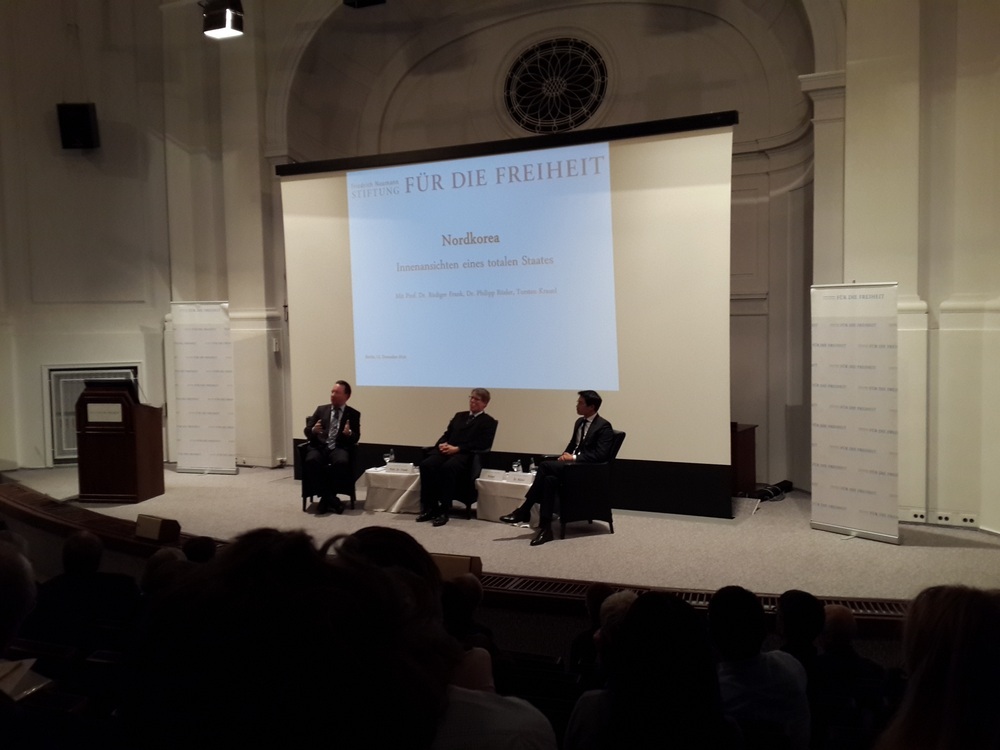 Image: Christian Koch |
At an event sponsored by the Friedrich
Naumann Foundation in Berlin, Dr. Rudiger Frank presented his book, North
Korea: Insight into a Totalitarian State. Dr. Rudiger Frank is, among other
things, a professor of East Asian Economy and Society at the University of
Vienna, and revered in the German-speaking realm as an expert on North
Korea.
Dr. Frank opened by touching on parts of
his book that focus on the gradually economic opening of the country,
peppered with much of his own personal experiences inside North Korea.
He concentrated on Korean studies at Humboldt University in Berlin
during the early 1990s and received the chance to go to Korea for further
language study. Despite a much stronger desire to go to South Korea,
Dr. Frank ended up in the North due to the partnership between Humboldt
University and Kim Il Sung University present at the time.
Despite opposing rumors, Dr. Frank is
convinced that Kim Jong Eun is indeed completely at the helm of power in North
Korea and elaborated that the young leader casts a wide distance between
himself–the so-called number one–and all the hotly
contested “number twos.” He does admit, however, that even after
various visits to the North, the country is “many things, but not
easy to understand.”
He added that North Korea’s economy is in state of perpetual development; its foreign
trade has doubled since 2008–owed mostly to dealings with China. “Things
are progressing in North Korea,” he said, while showing
pictures of a North Korean tablet he bought, running on Android OS
and containing several North Korean textbooks and dictionaries.
Where unification of the two Koreas was
concerned, Dr. Frank asserted that “South Korea is
learning the wrong parts of German Reunification.”
“South Korea is only focusing on the
financial side of unification and the costs it would incur,” he explained. “There is no real plan for the North Korean
people, military, or the North’s leadership in the case
of unification…The South does not see how they could benefit from the union;
for example, the South stands to reap significant profits by opening
companies in the North, which is abundant with natural resources.
A discussion panel led by Chief Commentator
Torsten Krauel of “Die Welt”, a reputable German daily newspaper,
featured debate between Dr. Rudiger Frank and Dr. Philip Rosler,
former Federal Minister of Economics and Technology and
current Managing Director and Member of the Managing Board of
the World Economic Forum.
When asked by Krauel if European companies
should invest in North Korea irrespective of the political situation, Dr. Rosler
demonstrated vehement opposition to the proposal. He stressed that he views the
slow opening of the country through a critical lens, as the myriad
obstacles–the nuclear program, human rights violations, and most of all,
sanctions–must first be overcome before any the realization of significant
progress.
On the nuclear issue, Dr. Frank stated, “The nuclear program plays such a pivotal role in the North. Altering
it would probably lead to internal instability.” He
added, “Some Koreans might argue that a united country
would likely need an nuclear program to keep China and Japan at bay in the
future.”
During the open portion of the seminar, the
audience questions overwhelmingly centered on China’s
role both in terms of unification, its interactions with North Korea, and its
responsbility for the North’s moves by extension. Both Dr. Frank and Dr. Rosler
agreed that China’s position is largely misunderstood
and misrepresented. “Even though China is seen as an
ally of the North, it is far from it: the relationship has become exorbitantly
more complex than that [recently],” the experts
asserted.

















